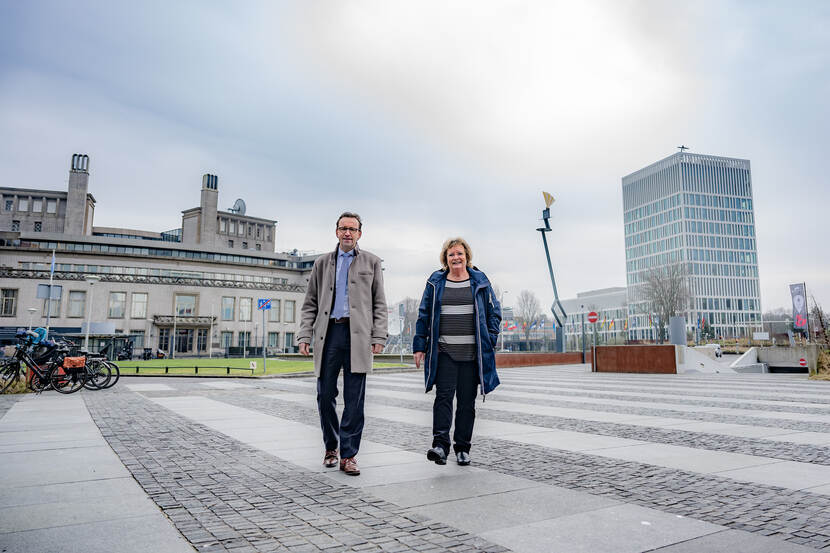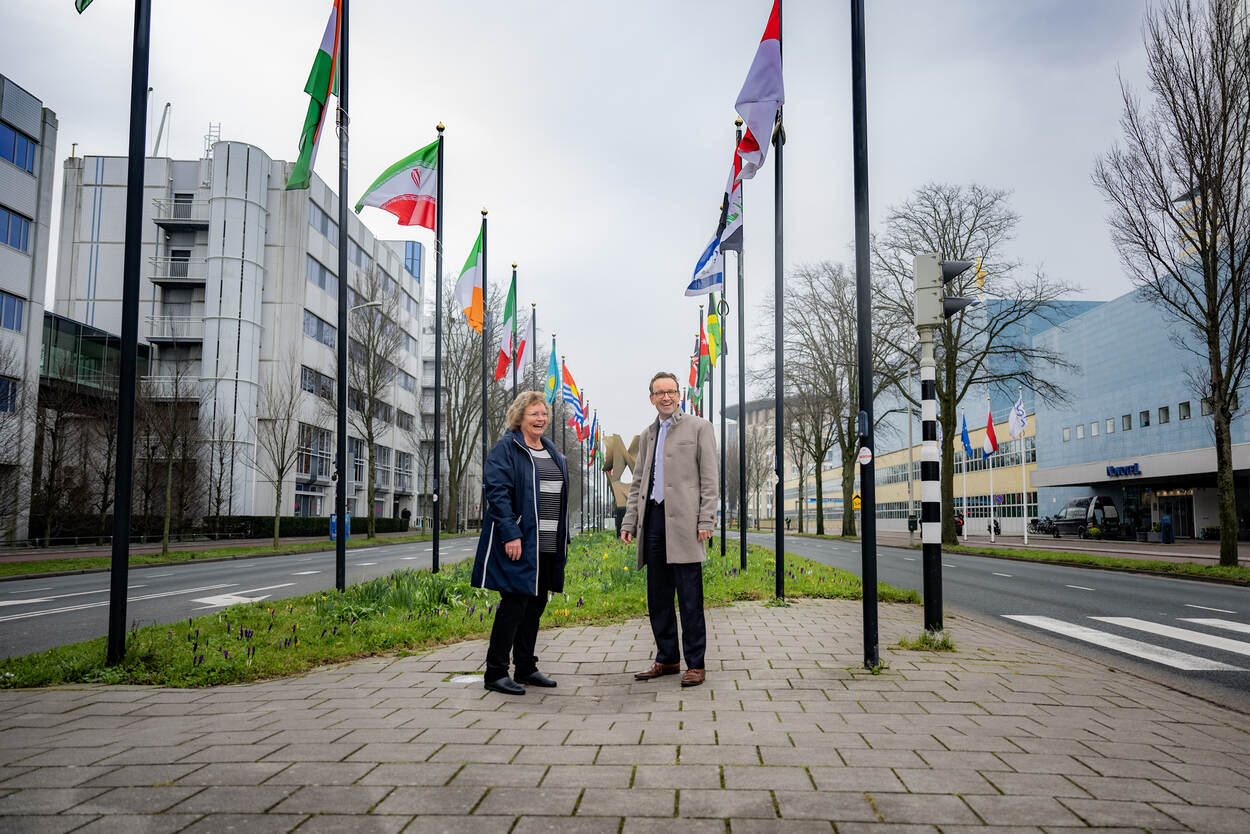Operational Management and information security at the mission
BZ’s operational management departments, the Housing and Real Estate Worldwide Department (DHF), 3W|WorldWide Working and the Financial Service Organisation (FSO) have joined forces within the Operational Management Branch (HDBV), creating a single service point for operational management. As an advisory and support unit, the Operational Management Section (BBV) not only supports HDBV’s internal coordination but also ensures effective teamwork and coordination with the rest of our BZ colleagues, both at the ministry in The Hague and at more than 150 Dutch missions abroad. BBV is the missions’ point of contact for all matters concerning operational management and information security. It’s also responsible for properly training the ministry’s operational managers (OMs) and its information management and security experts (IMBs).

‘For those who work in operational management, life at the missions abroad has changed dramatically in the past 20 years … Many administrative tasks are now carried out in The Hague.’
Centralising our operational management
‘For those who work in operational management, life at the missions abroad has changed dramatically in the past 20 years,’ says Marion Diekema, who works as a specialist adviser on operational management. Over the past 40 years, Marion has worked throughout the ministry and mission network, and she knows the organisation as well as anyone. She was also involved in the regionalisation and centralisation programmes, first from the mission in Berlin and later in The Hague as head of the Regional Service Organisation for Western Europe and head of the Consular Service Organisation. ‘These reorganisations resulted in the disappearance of almost all mission-based operational management jobs for administrative staff. Many tasks, such as assessing visa applications and paying invoices, are now carried out in The Hague instead of at the missions.’
Training operational managers
When Marion joined the Operational Management Section (BBV), the first priority was to invest in recruiting and training operational managers (OMs), a multifaceted job that involves overseeing the operations side of a mission abroad. As Marion explains, ‘the first OM basic training course took place online (because of the COVID-19 pandemic) in 2020, and we’re now interviewing candidates for the programme’s fourth edition, which will start in the autumn. The training programme starts with a 10-week course at the ministry in The Hague, covering all kinds of detailed knowledge in areas like finance, personnel, accommodation and consular affairs. After that, the OMs-in-training build up several months’ practical experience working in the field alongside experienced colleagues.’
External recruitment
At present, more staff are being posted from The Hague into OM positions at the missions. The reason for this shift is the stricter information security requirements we have to meet. To this end, we’re also recruiting from outside BZ, and as Marion makes clear, this can be an unsettling process for some missions. ‘At the same time, those missions also acknowledge that new people with fresh ideas are essential for change and for promoting diversity and inclusion. By hiring new people, the organisation can change and grow, though it’s also important to hold onto dependable OMs who know the organisation.’


Contact point for information management and security
As well as its stewardship of OMs’ professional expertise, BBV also provides advice to ensure that the mission leadership has its information management in order and is able to take well-considered decisions in this area. Although based in The Hague, Jelle Bakker is the missions’ global team manager and coordinator for complex IT issues. Working with 10 information management and security experts (IMBs), each based in a specific region, Jelle serves as the link between the missions and the ministry for matters relating to IT and information management and security. ‘With cyber threats increasing all the time,’ he says, ‘it’s more important than ever that we strengthen the mission network’s information management and security.’
‘With cyber threats increasing all the time, it’s more important than ever that we strengthen the mission network’s information management and security.’
IMBs: putting policy into practice
Jelle explains that the IMB team is the missions’ point of contact for information management and security issues that transcend BZ’s domain structure. ‘We help make clear what policy means for the missions in practice, turning the frameworks set by the Information and Digital Innovation Department (IDI), the Housing and Real Estate Worldwide Department (DHF), and the Security, Crisis Coordination and Integrity Department (VCI), into specific procedures, instructions and solutions. BZ has an enormous amount of policy, frameworks and rules, not to mention its systems and apps. It’s already a big challenge to provide the staff in The Hague with the guidance they need, let alone the 3,600 staff at the missions abroad. The fact that everyone can now use BZelf to search far more effectively than before is already a big step forward. We’re analysing the missions’ problems and needs, and we’re working on solutions. If a mission is considering buying its own hardware or software, for example, we’ll generally urge them strongly not to, as such matters are usually arranged centrally, and sometimes on the basis of framework agreements. Above all, we point out existing alternatives and help out with the relevant procedures.
‘We help make clear what policy on information management and security means for the missions in practice.’
Safe and responsible use of IT facilities
‘We also pay a lot of attention to safe and responsible use of IT facilities and information processing, something missions often won’t have such an affinity with. We offer support in this area, and our services are greatly appreciated.’ Jelle explains that the rise in home working that began during the pandemic has created a greater risk of security incidents, such as the accidental use of infected devices, opening phishing links in emails or conducting confidential discussions on WhatsApp or Zoom. Such incidents can be harmful not only to the organisation but also to the individual, as people may put themselves at risk, or make themselves vulnerable to blackmail.
In-person visits
The IMBs make about ten visits a year to missions in their region, including 80 high-risk missions that face a heightened risk of cyberespionage or counter-intelligence activity. During their visits to the missions, the IMBs provide security-awareness training and, with the help of a checklist, produce a report that is shared with the mission, IDI, DHF, VCI and the Inspection, Risk Analysis and Advisory Unit (ISB). This report contains recommendations concerning the set-up of the server space, zoning at the embassy, the use of applications, and compliance with the General Data Protection Regulation and privacy legislation.
‘The IMB’s role is to identify issues, offer advice and provide support,’ Jelle explains. ‘Although the IMB can help the OM and their team resolve any problems, the mission itself is responsible for taking necessary action.’
More information about the Operational Management Section and the Operational Management Branch?
(the links below are accessible to Central Government employees only)










